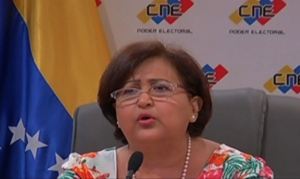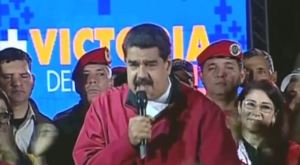
CNE’s Tibisay Lucena (archives)
President Nicolas Maduro in televised speech, claimed that Mugica was pressured by the United States and Britain. He also repeated the government’s claim that eight million people voted, adding that the turnout would have been 10 million if others had not been blocked by protesters. “This election cannot be stained by anyone, because it was a transparent vote,” Maduro said.
The Roundtable of Democratic Unity (MUD) which boycotted the vote, said turnout was less than four million, and that account was reinforced by journalists’ reports that dozens of polling places around Caracas were almost deserted on Sunday.
Julio Borges, the president of the MUD controlled National Assembly, said Smartmatic’s findings confirm what the opposition and election analysts had suspected. When using the term “opposition” one should note that the MUD held an absolute majority in the National Assembly. The Assembly was suspended by the Supreme Court earlier this year, claiming that the lawmakers were “in contempt”. The Supreme Court usurped the legislative powers of the National Assembly. These powers have now been transferred to the newly elected “Constituent Assembly”.
 Pre-election polls from a cohort of different polling companies consistently showed more than 70 percent of all Venezuelans opposed the election of the Constituent Assembly and changing the 19999 Constitution that was adopted under the late Hugo Chavez. The MUD contends the vote was rigged to pack the assembly with supporters of Maduro. Maduro’s opponents are demanding early presidential elections. The next scheduled election is October, 2018.
Pre-election polls from a cohort of different polling companies consistently showed more than 70 percent of all Venezuelans opposed the election of the Constituent Assembly and changing the 19999 Constitution that was adopted under the late Hugo Chavez. The MUD contends the vote was rigged to pack the assembly with supporters of Maduro. Maduro’s opponents are demanding early presidential elections. The next scheduled election is October, 2018.
Borges said lawmakers will ask the country’s top prosecutor to investigate members of the National Election Council for potential crimes. Attorney general Luisa Ortega Diaz, Venezuela’s top law enforcement official and a Maduro critic, told CNN in an interview Wednesday that she has opened an investigation into the allegations of vote manipulation. However, the Supreme Court, also earlier this year decreed that the prosecutor no longer could file criminal charges without the approval from a sitting judge.
 Despite the controversy surrounding voter turnout and the final results, Maduro plans to swear in the 545 members of the new “constituent assembly” so they can get to work. He originally set Thursday for the assembly’s opening session, but late Wednesday announced the new body would begin its inaugural session on Friday instead, for the sake of “peace and calm.” “It has been proposed,” Maduro said at a ceremony for the new assembly members in the capital, “that the installation of the National Constituent Assembly, instead of being held tomorrow, be organized in peace and calm, with all necessary protocol, on Friday at 11 a.m.”
Despite the controversy surrounding voter turnout and the final results, Maduro plans to swear in the 545 members of the new “constituent assembly” so they can get to work. He originally set Thursday for the assembly’s opening session, but late Wednesday announced the new body would begin its inaugural session on Friday instead, for the sake of “peace and calm.” “It has been proposed,” Maduro said at a ceremony for the new assembly members in the capital, “that the installation of the National Constituent Assembly, instead of being held tomorrow, be organized in peace and calm, with all necessary protocol, on Friday at 11 a.m.”
Details on what might be included in a new constitution are unclear. Maduro has said it is the only way to pull Venezuela out of its severe economic crisis and stop the daily protests that have killed more than 120 people since April. However, the “majority” opposition says the PSUV’s goal is to dissolve the MUD-controlled National Assembly, fire anyone who disagrees with the government, and turn Venezuela into a socialist dictatorship.
CH/L – nsnbc 03.08.2017
 RSS Feed
RSS Feed

















 August 3rd, 2017
August 3rd, 2017  Awake Goy
Awake Goy 


 Posted in
Posted in  Tags:
Tags: 
















